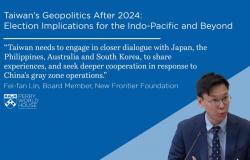The author’s views expressed in this paper are entirely her own (unless otherwise stated) and do not, in any way, represent the official policies or position of the Armed Forces of the Philippines, or any other institutions she is affiliated with.
Given the recent developments in the security environment of the Asia-Pacific, such as the heightening tensions in the Taiwan Strait and the South China Sea, the Philippines comes into the spotlight as it pivots from a pro-China stance under the Duterte administration back to strengthening its security alliance with the United States under the Marcos Jr administration. With the country’s geographic proximity to Taiwan and its strategic location connecting the South China Sea and the Pacific Ocean, questions of how the country will uphold its own national security interests while navigating US-China rivalry are central to the strategic calculations of the Philippine defense establishment , particularly with regard to a Taiwan contingency. Increasing Chinese aggressiveness in the maritime domain, coupled with intensifying cross-Strait tensions, has also highlighted important security conversations in the country, particularly regarding competing national and local interests, and identifying and safeguarding against malignant influence operations.
As a country wherein its prime geostrategic location in the region has been both a boon and a bane to strategic and military planning, the top politico-security interests of the Philippines are the defense of its territorial integrity and sovereignty; the protection of the Filipino people’s lives, livelihood, and liberty; sustaining the country’s commitment to upholding international law and the rules-based order, and contributing to regional peace and stability. As these interests have increasingly been challenged by China’s coercive diplomatic, political, military, and economic activities, the country’s defense establishment has been shifting its strategic priorities from a decades-long internal security focus towards external defense. Now on “Re-horizon 3” of its modernization program, the Armed Forces of the Philippines (AFP) has committed to acquiring capabilities that will enhance its domain awareness, connectivity, intelligence and reconnaissance, and area denial and deterrence capabilities on both the country’s external maritime and aerial domains. Moreover, the Department of National Defense has committed to the development of its “comprehensive archipelagic defense concept,” which is designed to ensure that the country benefits from the natural resources found in its exclusive economic zone, and to “allow it to project power in areas that must be protected and preserved.”
Further, in light of the increasing aggressive activities of Chinese forces against the Philippine government and civilian fishing vessels in the South China Sea, the Philippines has increased other defensive measures, and one is to strengthen its security alliance with the United States. Aside from the development of unilateral contingency plans in response to a Chinese invasion of Taiwan, the Philippines continues to bolster its security partnerships, most especially with the United States, for the defense of the archipelago. Its recently agreed locations in northern Luzon under the Enhanced Defense Cooperation Agreement (EDCA) allows the Philippines to plan for and employ more effective and efficient defensive measures in cooperation with the United States, if only to protect its territory should China decide to undertake an invasion of Taiwan. Contrary to Chinese pronouncements and analyzes that the Philippines is merely a “pawn” of the US in provoking China with these recent developments under EDCA, the country’s decision to strengthen its security alliance with the United States should be understood as a sovereign nation’s prerogative to rack up its defenses against repeated incursions to its territory, and increased aggressiveness against its people.
Moreover, the Philippines is currently at the center of deepening its partnerships between US allies in the Asia-Pacific. The annual Balikatan exercises, the most prominent bilateral joint military exercise between the Philippines and the United States, has steadily expanded to include the participation of other US allies in the region such as Australia and Japan, and other like-minded regional militaries under its International Observer Programme. In addition to the Visiting Forces Agreements that it has with the United States and Australia, the Philippines is also in negotiations with Japan for a Reciprocal Access Agreement designed to enhance cooperation and interoperability between the AFP and partner forces.
It must be noted, though, that the imperatives of its security alliance with the United States and the economic benefits and geographical proximity of China significantly complicate how Manila shapes its defense policy and strategy moving forward. Furthermore, the Philippines is a status quo power and is not about to “rock the boat” by developing official relations with Taiwan; it adheres to a One-China Policy as stipulated in the Joint Communique between the Philippines and China signed in 1975. As such, although there have been recent individual engagements between some Philippine politicians and Taiwanese leaders, such as the visit of Senator Risa Hontiveros to President Tsai Ing-wen of Taiwan and the controversial congratulatory tweet by President Marcos to Taiwanese President-elect Lai Ching-te, these do not necessarily translate to diplomatic support from the Philippines for Taiwan, nor official security cooperation on the operational level. The Philippine defense establishment maintains that it does not pursue official military engagements with Taiwan in view of its One-China Policy, nor will it attempt to in the foreseeable future.
However, this does not preclude the prospects for Philippine support to US forces in case of a Taiwan contingency. With close to 200,000 Filipinos in Taiwan, it is in the Philippines’ interest to closely monitor cross-Strait relations and utilize military installations in its northernmost regions for rescue and repatriation missions in the advent of a Chinese invasion of Taiwan. Furthermore, it is in the best interest of the Philippines to maintain the status quo, as a major conflict will have massive ramifications such as refugee flows and a possible spillover of the conflict to Philippine territory. Further, a Chinese takeover of Taiwan will also mean that China has effectively established control over the Luzon Strait, among other strategic waterways within the First Island Chain and that there will be increased pressure from Beijing not only in the country’s western seaboard, but also in north of the archipelago.
The sheer complexity of the country’s position has been discussed in security policy and academic circles within and outside the Philippines. The debate has not only permeated strategic conversations at the national level, but also at the local level, particularly in provinces where military installations under the EDCA are to be located. Some scholars describe this as the “localization of US-China rivalry,” which has considerably altered national-local political dynamics and security decision-making in the Philippines, pitting national security interests against local economic development (Despi, 2023). Cagayan, one of the provinces closest to Taiwan, stands as an example of this. With plans to bring investments from China, Cagayan Governor Manuel Mamba sees the recent developments in the US-Philippines alliance as unfavorable to his province’s interests. A well-known pro-China politician, Mamba has been actively opposing US presence in Cagayan, and succeeded in preventing live-fire exercises between the Philippines and the US and other allies during the 2022 iterations of the Balikatan and Kamandag military exercises (Despi, 2023). Security experts note that Cagayan premised opposition to the live-fire exercises on three major points: that it would create a diplomatic issue with China; that the province might be embroiled in a crisis in the Taiwan Strait; and that US military activity in the area may jeopardize potential Chinese investments. Here, we can see that the willingness of local government actors to advance their province’s interests highlights a susceptibility to foreign influence which may prove detrimental to national security interests in the long-term.
Albeit long overdue, we can also observe an increase in discussions in Philippine security circles regarding China’s malign interference and how it has been able to penetrate certain provinces and regions from Luzon to Mindanao through its “influence operations.” For this, many are looking at Taiwan for insights, where these disinformation campaigns and propaganda activities to undermine democratic institutions and processes have long been in place. As for the Philippines, alongside its efforts towards exposing China’s aggressive “gray zone” activities in the political, economic, military, and cyber/information domains, the government is now working towards the passage of an Anti-Foreign Interference Law to set up safeguards against coercive activities and influence operations that threaten to undermine the country’s sovereignty and democratic institutions.
These important debates open a door for possible (unofficial) cooperation between Taiwan and the Philippines, as both feel the impacts of China’s coercive measures in several domains. After its successful elections, Taiwan could provide much insight to Philippine institutions about countering malignant interference in democratic processes. Lastly, although official military cooperation is off the table, other possible cooperative activities on security issues include educational exchanges and conversations on increasing resilience against the myriad measures of Chinese malign influence and political interference, particularly cyber-attacks, and influence operations targeting government agencies in the national and subnational levels.
Additional Works Cited
Despi, D. (2023, July 21). The Influence of China’s Economic Statecraft of Philippine Security Decision-Making: The Case of Cagayan Province. COP, AFP Colloquium on Military Education
Tags: Complexities Philippine Security DecisionMaking Taiwan Contingency
-





